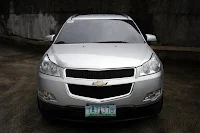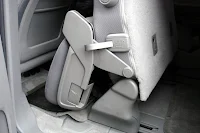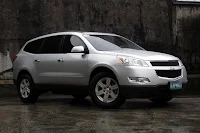 |
| Photos by Ulysses Ang |
Let’s
get one thing out of way: if you’re in the market for a Ford Explorer, you
probably won’t even consider the Chevrolet Traverse. Given that they have
similarities such as originating from North America and that they’re similarly
sized comparison between Ford’s and Chevrolet’s large crossovers is inevitable.
But what if I told you size only goes so far. What if I told you that the
Traverse and Explorer are apples and oranges—almost incomparable in both design
and execution. You don’t believe me? Read on.
Where
the Ford Explorer struts its sleek sheet metal like a peacock on heat, the
Chevrolet Traverse requires a much more careful look see. From afar, it looks
mild mannered, almost invisible in the sea of crossovers, but there are
interesting design cues splattered here and there. For instance, there’s a hint
of Camaro in the Traverse. The scallop-shaped headlamps, simple rounded tail
lamps, hunkered stance, even the subtle side crease and kink all whisper
Camaro. Frankly, the Camaro link was almost lost to me, if not for my Chevrolet
fan boy of a brother-in-law. And if Chevrolet fans approve of the Traverse,
then it certainly passes the most important litmus test.
The
Traverse’s sheet metal actually does a good job of masking the crossover’s
surprisingly large girth. In comparison to the rest of the Chevrolet line-up,
the Traverse is actually almost as big as the Tahoe—making it an even bigger
crossover than the Ford Explorer. As a result, it’s got the best space of any
8-seater crossover I’ve tested so far, including the Explorer. Not only does
the Traverse outdo the Ford in space efficiency, it also does so in space
utilization. Whereas the Ford makes do with a fixed second row with a tilting
function for getting into the third row, the Traverse’s second row actually
tilts, slides, and tumbles allowing for excellent access to the generous third
row seating. The third row’s actually even better than the larger Ford
Expedition EL; plus, there’s still some decent space left for groceries with
the third row up. Flip both rows of seats down, and you get a massive flat
loading space allowing the Traverse to swallow a 52-inch flat screen TV with
ease. In short, if you need a true family hauler as opposed to a high-level
executive car, the Traverse becomes the much better choice.
Sadly,
despite a pricing north of P 3-million, the Traverse could have come with a
better interior. Don’t get me wrong. It’s pretty modern in terms of ergonomics
and control placement, but it feels its age with the green fluorescent lighting
used on the instrument panel, shift indicator, and multi-function system. It’s
a shame given the interior fit is actually good, but the materials used are
hard to the touch and inconsistent throughout the cabin. What’s more, it could
have come better loaded. In the front-wheel drive model tested, you get pretty
modest luxury features such as a leather wrapped steering wheel, a reverse
camera, and an aftermarket audio system fitted with a GPS navigation system.
There’s no moon roof, no leather seats, no fancy voice-command feature. In
other words, the Traverse feels like a bare bones model for all that money. If
you can afford it, go for the all-wheel drive model which addresses the bare
interior issue.
The
massive size, coupled with the all-terrain 255/65 R 18 tires will make you
think that the Traverse is a traditional body-on-frame SUV. Thankfully, that’s
farther from the truth as the Traverse is a true uni-body crossover riding on
Chevrolet’s Lambda platform (shared with a couple of other Chevrolet, Buick,
and Cadillac models). The story of the Traverse’s efficiency doesn’t end there
as it’s got a Camaro-sourced V6 engine as well as a six-speed automatic.
The
3.6-liter V6 underneath the Traverse generates a healthy 288 horsepower and 366
Nm. But more than just peak figures, this engine has good low and mid-range
punch giving the Traverse sprightly acceleration. Despite its heft, it feels
light on its feet, especially when accelerating from a standstill. There’s no
shortage of power whether overtaking, cruising, or climbing up Tagaytay. Plus,
there’s a bonus of having a snarly engine note. The six-speed’s shifts are
smooth and consistent making the drive, be it in-town or out-of-town, a smooth
experience. The Traverse returned 4.65 km/L after a week of driving.
Another
surprising aspect of the Traverse is how well-tuned the suspension is. On one
hand, it’s imbued with some engaging driving characteristics. The chassis feels
tight and exhibits manageable body roll. On the other, it’s comfortable,
soaking up the bumps, ruts, and what have you with composure and ease. Of
course, this isn’t a Camaro, so don’t expect it to do donuts in a mall parking
lot, but you’ll appreciate how comfortable it is for all occupants (most
importantly the driver) during extended trips.
Clearly,
the Chevrolet Traverse doesn’t have the sex appeal of the Ford Explorer, but it
has some aces up its sleeve, particularly in terms of flexibility and space.
The Traverse actually doesn’t feel like your traditional crossover. It’s sort
of a segment buster, marrying the best traits of a crossover to that of an MPV.
It’s the practical and efficient family hauler without the soccer mom image. If
you’re attracted to style and features, the Explorer’s pretty hard to beat. But
family-oriented owners may want to give the Traverse a good look. It’s one of a
rare breed of crossovers that deliver genuine seating for eight, huge amounts
of cargo space, and respectable fuel economy.






















This crossover is actually the prettiest Ive seen this year so far.
ReplyDeleteIts so intimidating when you see one in person, unlike the Ford. It looks so classy than most of its counterparts.
Shoot, im actually referring to the 2014-2015 model. Saree. Haha.
Delete